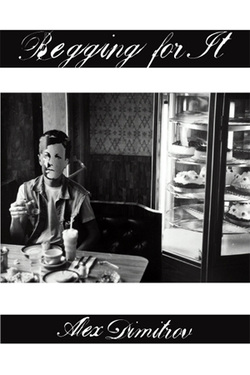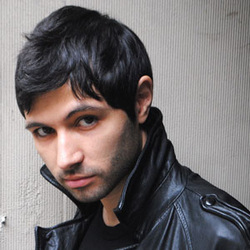Matthew Thorburn, Poet - Author of Dear Almost
Menu
 Alex Dimitrov was born in Sofia, Bulgaria. He is the recipient of the 2011 Stanley Kunitz Prize from The American Poetry Review, and his poems have appeared in the Kenyon Review, American Poetry Review, Yale Review, Boston Review, Tin House, and Slate, among others. He is the founder of Wilde Boys, a queer poetry salon in New York City, works at the Academy of American Poets, teaches creative writing at Rutgers University, and frequently writes for Poets & Writers magazine. Dimitrov is also the author of American Boys, an e-chapbook published by Floating Wolf Quarterly. He received his MFA in poetry from Sarah Lawrence College, and his BA in English and Film Studies from the University of Michigan-Ann Arbor. He lives in Manhattan. I was struck by the fact that several poems in Begging for It are about America and the last poem in the book, “I’m Always Thinking About You, America,” is even addressed to America. In your work, America—this abstract notion, or this large, complicated country—is made personal through intimate address. Reading these poems made me think of Allen Ginsberg’s famous poem, “America,” though your approaches are quite different. What does America mean for you as a poet—and for your work? Ginsberg is a huge influence and America has remained interesting for me too. Perhaps because it’s always changing, it isn’t fixed, and everyone has such strong opinions about it…even strong ambivalence. I like to think of America as a center full of fire. And I’m drawn to that fire because that’s exactly where I want to put my reader. There are several self-portrait poems throughout the book that help tie it together—but interestingly, they’re all self-portraits as someone else, and in fact as either a fictional character or an actress playing a character. Of course, some people would say every work of art is in some ways a self-portrait, but still I want to ask: what is the appeal of a self-portrait for you? How did these particular “Self-Portrait as” poems come about? My favorite film is Jean-Luc Godard’s Contempt. Brigitte Bardot’s character in that film is a complicated one. She’s not a femme fatale, she’s not assertive, though certainly not passive either. She isn’t entirely genuine nor is she inauthentic. I don’t think anyone knows who she is or what she wants. I’m drawn to characters like that because I think they come close to some sort of truth about life. Brett Ashley from Hemingway’s The Sun Also Rises and Daisy Buchanan from Fitzgerald’s The Great Gatsby are also those types of characters, I think. They don’t care if you love them and want you to love them simultaneously. They’re human and unknowable both. To be human is to be unknowable perhaps. And not to pretend otherwise. I was going to write another self-portrait, as Blair from Bret Easton Ellis’s Less Than Zero, but it never happened. Maybe in the future. But I wouldn’t want to repeat myself. I don’t really believe in rules except for that one. You have to change. Begging for It moves forward and flows from poem to poem in interesting ways. How did you go about organizing these poems into a book? I wonder if you could talk a little about the larger structure that these poems inhabit. Was it something you had in mind as you were writing, or did you write the poems first and then find the shape of the book? I had to be in love with every single poem in the book. That was the only thing I was concerned about when I started to think about order. That there couldn’t be any filler. I had to love everything, otherwise why publish it? The order came easily after I got to that point. That took a while though. Four, five years maybe. How does a poem start for you? Specifically, how did “Night Flights” and “To the Thirsty I Will Give Water” start? “Night Flights” I started writing one morning when I was visiting my ex-boyfriend at Princeton. He was going to graduate school there. I remember the scent of his shower took me back to some place from my childhood and that situated me within the aura and time of “Night Flights.” Originally, the first stanza was all about trying to describe that—the being taken there—and then of course I realized that no one really wants to know how you got to the heart. They just want the heart. Or maybe I just don’t want to tell how I got there. Or I have no idea. But I got there. And that’s where I want to stay even though no one can stay there. With “To the Thirsty I Will Give Water,” well, that was written in response to a news story about a man who drove his car into the Gowanus Canal. It’s a poem about redemption and living for love. Even when life is really terrible, I still want to live. And that poem accepts that and also wonders why that is. Why the desire for life. Let me know if you find out…  What’s next? What are you working on now? My second book of poems, a novel, and some other things. Finding the right chairs for my new apartment, most immediately. And lastly: What are you reading—or what have you read recently—that moved you? I went from Truman Capote’s novels to his short stories to his essays to his letters, in that order. And I’ve been seriously reading and rereading him since last August. I think he’s one of the greatest writers of all time. His conversational portraits are some of the best nonfiction I’ve read. It feels even silly to assign them to a genre, they’re so much more advanced than that train of thought… genres. I feel like the last seven years were my Ginsberg and Wilde periods. I’m in my Capote period now. I leave my lion desk lamp on for when I come home late at night, if you know what I mean. Two Poems from Begging for It:
To the Thirsty I Will Give Water Yesterday morning while I read Montaigne a man drove his car into the Gowanus canal. I have never seen a greater monster or miracle than myself, Montaigne wrote in the late 16th century. It was a bright day. The sun forgave no one. Not even the firefighter who first saw the car taken by the water while he was praying, lighting a cigarette, remembering his lover’s face-- what was he doing, what did he think of before diving in? It is not death, it is dying that alarms me, Montaigne tells us. Because he swallowed enough black water during the rescue the firefighter was given two Hepatitis B shots afterward. The man who lost his car was given his life back. We were given Montaigne’s heart which is preserved in the parish church named after him in the southwest of France. We were given more than we can drown. Night Flights One night before my father came she caught me in the yard counting off night flights, keeping tally. The large machines sped over loud and without grace. Each one I pointed to the nearest airport. And those which headed east toward New York or some other city-- they made it. The rest crashed suddenly in someone else’s life. For more info about Begging for It, visit the Four Way Books website and Alex's tumblr.
0 Comments
|
 RSS Feed
RSS Feed
